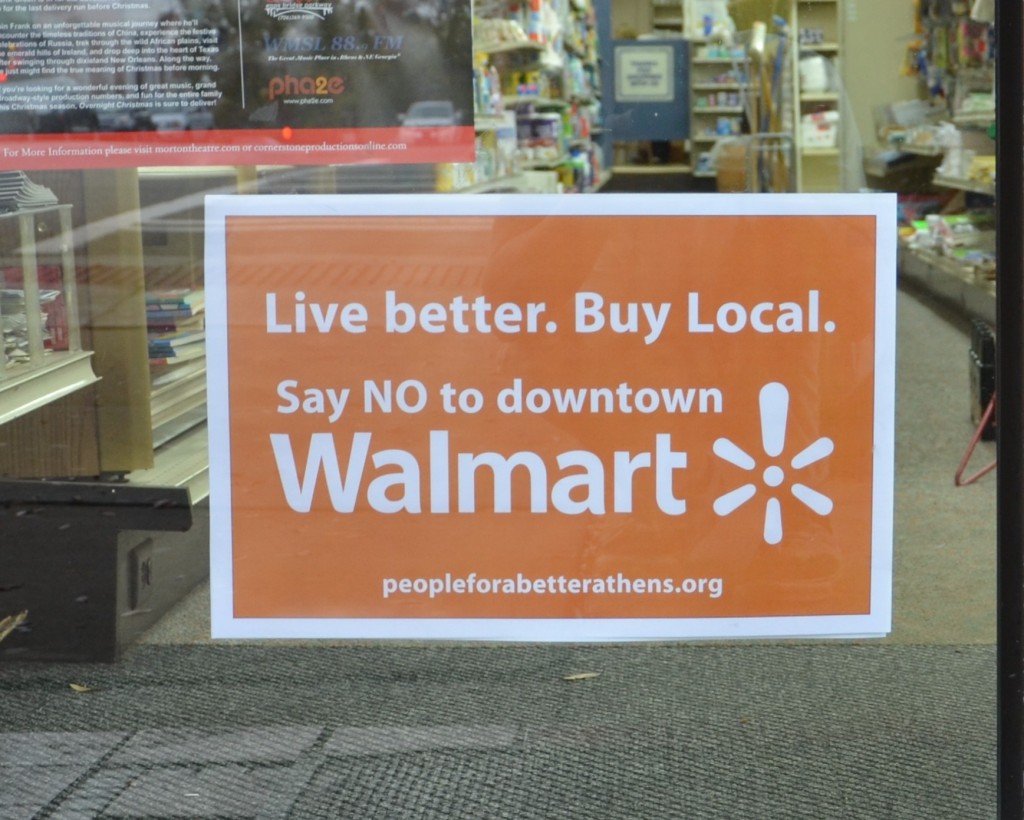By EMMA KISSANE – Managing Editor
A proposed mixed-use development near Downtown Athens caused controversy among Athens-Clarke County government and citizens.
In September of 2011, the Athens Banner-Herald ran an article titled “Wal-Mart: No store planned for Downtown,” essentially dispelling the rumors that “the mammoth chain (was) considering building a small store on the edge of Downtown Athens.”
Talk of the development quickly died down, until an article published on Wednesday, Nov. 16 titled “Big development planned near Downtown Athens” igniting controversy concerning plans for an Atlanta development firm Selig Enterprises’ interest in a 10-acre tract of land between East Broad St. and Oconee St., stretching to the Oconee River.

Photo by Carlo Nasisse
Selig Enterprises did not respond to inquiries from this publication requesting comment.
Since newspapers were distributed that Wednesday morning, Athens has immersed itself in discussions of advantages, disadvantages and possible alternatives to a proposed mixed-use 200,000 square foot development. Controversy has arisen, primarily concerning the inclusion of Wal-Mart, a large international chain known for offering food, goods and services at low prices, as the development’s 94, 000 square foot anchor store.
Athens Clarke-County Mayor Nancy Denson and ACC Commissioners have been on the receiving end of much of the commentary.
“We can persuade, we can talk, we can say we would like for you to do some things different. Quite honestly, (Selig Enterprises) is really open to discussing modifications or things that can make it work, but basically they are investors. They are trying to develop a product that will meet the needs of the community, but that also can make a profit,” Denson said. “We can’t dictate to them, ‘We don’t want you to put this store, we want you to put in three smaller stores.’ That’s not an option that we have. And that’s what some people in the community would like for us to do.”
Selig Enterprises, a family-owned but far-reaching real estate company founded in 1918, applied on Tuesday, Nov. 15 to demolish a total of 13 buildings. Three of these are “contributing buildings” to the Athens Warehouse Historic District, originally listed on the National Register of Historic Places in 1988 and consisting of late nineteenth- and early twentieth-century warehouses, according to the Athens-Clarke Heritage Foundation.
The three structures are the Jittery Joe’s Roasting Company warehouse, the Dixie Canner Company, and a cotton shed formerly used by Armstrong & Dobbs, a building supply company. According to blueprints released by Selig, plans for the development involve an entertainment and dining plaza, free-standing restaurants, two-level retail and residential space and the anchor store.
Smaller stores are likely to be both chains and local businesses, according to an ABH editorial by Scott Selig, but the greatest amount of protest has stemmed from the proximity to Downtown Athens and the inclusion of Wal-Mart, which will be approximately 50 percent groceries and 50 percent other merchandise, according to Denson.
Denson has taken it upon herself to take part in the research and investigation of Wal-Mart’s wages and practices, committing to reading all emails sent to her involving the development, and has spent hours watching YouTube videos about Wal-Mart. However, she admits to the difficulty of sifting through “what’s facts and what’s someone’s opinion,” as well as “what’s current and what’s 20 years old” in order to reach a suitable agreeable decision.
“That’s one of the reasons I haven’t said a lot about it publicly. I tell people sometimes I don’t agree with myself,” Denson said. “They say, ‘How do you not agree with yourself?’ I say, ‘Because sometimes you have to compromise to get something done to get where you need to be.”
Jittery Joe’s Roasting Company co-owner and Athens Coffee Company owner Bob Googe does not see the demolition of the Roaster as being subject to compromise, but nonetheless regrets the likely loss of the cornerstone of his local business. Jittery Joe’s owns the business, but not the building or the land where they are housed.

Cartoon by William Kissane
“(The Roaster) is an awesome place; it’s like stepping back into a different century. This place has been around since the 1920s and it’s really a part of Athens history. It’s been around since cars were first driving up and down the road,” Googe said. “People come and sit on the front porch when the weather is nice and have a cup of coffee and talk politics and visit. As much as any building, it’s quite the community center.”
Approximately three months ago, Googe, coowner Michael Ripps and coffee roaster Charlie Mustard became aware that a development firm was conversing with the owner of the land and building about purchasing the package.
After discovering that the firm in question was Selig, Jittery Joe’s representatives were finally able to arrange an initial meeting to discuss the plans for the land. Selig offered space in their development for Jittery Joe’s to use as a re-creation of the Roaster.
“They obviously had never been to our building, because they took our 6,000 square foot establishment and dropped it in a 1,000 square foot space. That will never work,” Googe said. “They said if they got more information they would follow up. And they never followed up. And the next thing we heard was picking up the newspaper and read that a demolition permit had been (pulled).”
Googe and Ripps met again with Selig representatives on Tuesday, Nov. 29, during which plans were confirmed. Selig’s purchase means that Jittery Joe’s’ plans to inhabit the Roaster for at least 10 more years are invalidated. Googe has several possible alternative locations, if the Selig development inclusion falls through.
“The loss for Athens is not the Roaster. The Roaster is staying somewhere in Clarke County. The loss is the kind of cool factor that it gives (the surroundings),” Googe said. “This kind of thing is what makes Athens unique.”
A majority of Jittery Joe’s’ frustrations stem from the probable Wal-Mart anchor store.
“We’re not even against the development; we’re hoping that Athens can be better than a 100,000 square foot Wal-Mart on the edge of Downtown. This property around here, it’s just begging to be developed with something really cool. Wal-Mart
is the antithesis of cool,” Googe said. “I do think that they have good intentions. But sometimes good intentions run up against other realities and especially in a large company, those realities almost always win. If you’re like us, if you live in town, sometimes we sacrifice our economic realities to maintain a sense of who we are in the community.”
Although Wal-Mart allegedly was not Selig’s first choice for the anchor store, Googe acknowledges that it is the profitable choice to make.
“Wal-Mart wasn’t their first choice but they’re the ones with the money to do it,” Googe said. “So (Selig is) definitely thinking about the money because they’ve got to make a profit.”
In addition to the destruction of historic sites, including the Roaster, the effect the development may have on Downtown Athens is of concern to some community members and to local business employees.
Horton’s Drug Store, a family-owned pharmacy located in Downtown Athens since 1946, is one of several local businesses concerned about the effect of the mixed-use Selig development. Employees are very vocal with their opinions.
“You come (to Horton’s) and it’s old timey and sort of smells like your grandma’s basement and it’s a different feel,” Horton’s employee Ali Barnes said. “We do have a lot of regulars that come in and we know them by name and we talk to them and help them specifically, as opposed to Wal-Mart’s (methods).”
Owner Bill Horton, an employee since 1959, is also unable to see any benefits Wal-Mart would have on the Athens community.
“I’m not a Wal-Mart fan; I do not shop at Wal-Mart. They put so many small businesses out of business. I can’t see that it will help. How much it will hurt, I don’t know,” Horton said. “I have been given some (People for a Better Athens) signs to encourage (Athenians) to shop local.”
The surplus controversy has spawned a great amount of community involvement in the form of protest groups, the most prominent of which, People for a Better Athens, is led by local attorney and University of Georgia graduate Russell Edwards.
People for a Better Athens is primarily housed on a Facebook page providing frequently-updated news concerning the protest movement and the development in general. Edwards, one of two administrators of the page, posts updates and responds to input. Edwards has also facilitated a petition and survey, both of which aim to prevent the inclusion of Wal-Mart in the development.
“I was shocked, incredulous, upset (when I first heard of development plans). Ready to get to work,” Edwards said. “I think that Wal-Mart as a whole will have a severely negative effect on our Downtown Athens community. Right now, I’m just spreading the word. It’s my goal to bring all of Athens together to execute a common vision for the future of our city. If we don’t execute that vision for this piece of land, the most valuable piece of land in Athens, we will suffer the consequences for many years to come.”
As coverage of the development has increased, many citizens have contributed personal opinions of and connections to Wal-Mart. For some Clarke Central High School students, Wal-Mart is viewed as a necessity.
“Yeah, I shop at Wal-Mart,” CCHS senior Troy Yearby said. “They have some good products and things. They benefit people because they can go to one place to get everything they need instead of shopping at many different places. I think (high school students) need Wal-Mart. But after Macroeconomics, (learning) about how they treat people, it kind of made me think badly about them.”
Much of the frustration with Selig’s choice of anchor store relates to research and studies documenting Wal-Mart’s history of business practices and wages available on the Internet, research that varies widely concerning its perspective on the chain.
Although she herself has investigated Wal-Mart, Denson has avoided declaring approval of the People for a Better Athens group. She attended a meeting on the evening of Wednesday, Nov. 30 at local restaurant Ted’s Most Best.

Photo by Emma Kissane
“It’s really hard to tell what their goal is,” Denson said. “(Edwards) was saying, ‘We’re going to stop this (development).’ Well, I don’t think that’s a very realistic statement, because how are you going to stop something that has a legal right to exist? If you can’t stop something by persuasion, what’s your other option when it’s something that’s legitimately legal to do? When that’s the only rhetoric, I think it’s counterproductive.”
Denson does acknowledge that some positive contributions were made at the meeting, even though Selig holds no obligation to consider community input.
“There was some shouting and unreasonable statements made, but for the most part they were thoughtful, considerate, caring people that really love Athens,” Denson said. “The most productive part was after the meeting was over and individuals were coming up and we were talking one-on-one.”
In regards to the research concerning Wal-Mart, a variety of statistics have been floating around between involved Athens citizens contributing to both sides of the argument.
According to payscale.com, an average Wal-Mart sales associate earns between $7.50 and $10.64 per hour, adding up to between $15,600 and $22,131 yearly salary for a 40-hour work week. The median yearly household income for Athens Clarke-County is approximately $32,727, according to the U.S. Census Bureau.
Wal-Mart’s business practices have also been commented upon. According to a 2007 study by the Institute for the Study of Labor at the University of Bonn, Wal-Mart’s business model, coupled with a tendency to put other retailers out of business, eliminates three jobs for every two it creates, reducing retail employment by an average of 2.7 percent in each county the chain enters, as cited in an article published in The Nation, “Wal-Mart’s Fresh Food Makeover.”
Despite negative feedback, Denson discussed the likely economic benefits of the development and of Wal-Mart for ACC.
“We started the year (2011) out with $1.9 million short. The infusion of tax money into the county (from the development) is going to be significant,” Denson said. “This is an $80 million investment in our community.”
Denson continued to explain that the development is projected to bring in over $1 million per year in taxes on real estate, meaning approximately $600,000 for the Clarke County School District. Sales and inventory taxes will also contribute to the gross revenue gained by ACC.
Besides strictly economic profit, the development will bring 300-350 low-paying jobs to Athens, and a grocery store located so close to Downtown that will provide benefits to students and low-income citizens, according to Denson.
“Oh, absolutely (there is a need for Wal-Mart). There are people who don’t agree with this, and you can have good people that have polar opposite opinions, but it doesn’t mean either one of them is totally wrong,” Denson said. “People with low skills and low education have to have a place to start to develop those skills so they can move up through the hierarchy and have upward mobility. If the first job that you need to get is not there, you have no place to start, so I think that’s a benefit.”
The development will also contain numerous parking spaces, providing Downtown Athens customers
another option.
“(Customers) can park and they can stroll Downtown and look at the other shops and say, ‘Hey, this is a cute little shop, I’d like to go in there.” They’re not necessarily going to stay on that property; they’re not going to just come to the Selig property and leave,” Denson said.
The largest response from the ACC Mayor and Commision was issuing a 90-day destruction delay on the development under a law allowing the commission to protect historic buildings.
“One thing that the 90-day moratorium certainly does is it buys this movement time to continue spreading awareness and to continue mobilizing people. So I applaud (Commissioners) Kelly Girtz and Alice Kinman for putting a hold on the demolition permit application,” Edwards said.
Selig has grown more involved with the Athens community due to the persistent feedback, and Selig Representatives have had conversations with many community leaders, including Nuci’s Space Executive Director Bob Sleppy, R.E.M. Manager Bertis Downs and local musician and director of UGA’s Music Business program David Barbe.
Googe was appreciative of the amount of time Selig representatives spent “listening to people in the community,” approximately four to six hours in one day, during meetings for which they brought plans, layouts and blueprints.
Although it is at this point clear to Googe that preservation of the Roaster is unlikely, Selig plans to attempt to use Roaster building materials in the new space, if Jittery Joe’s agrees to their inclusion in the development. The hired architect for the project is visiting Athens to assess the Roaster.
Denson has also engaged in communication with Selig, and traveled to Atlanta to visit two comparable Selig developments, one of which includes a Wal-Mart, the other a Publix.
Another community member who has been contributing to the discussion is Flagpole Magazine columnist Kevan Williams. Williams writes the “Athens Rising” column on new developments in Athens.
“I’ve been speaking with developers, and a lot of different folks, trying to figure out what are the connections that need to happen, so that the right arguments can be made and the best possible product can come out of it,” Williams said. “You don’t want to come up with your own idea and lay it on the table and let them shoot it down; you kind of have to help them see what you see about Athens.”
Williams’ primary interest in the development is the design and the integration into Downtown Athens. Currently, Selig blueprints show an “off-the-shelf” model, according to Williams; the outside plaza is the primary “experience.”
“Personally, I’m not going to be the one who decides whether or not Wal-Mart is a good business. There are other people who can do it better and with more passion than I can,” Williams said. “I’m more interested in the design and seeing the images as they are because (the blueprints Selig has provided) are pretty deceiving images in terms of what actually goes into the site.”
Williams would prefer to create a “continuous experience” with Downtown Athens, which would mean reevaluating some of their plans.

Photo by Emma Kissane
“They create that sort of main street experience on that one block, but the backside of it is going to be a grassy slope set pretty far back from the street,” Williams said. “It’s not going to be a pleasant experience for pedestrians, looking at the backside of a Wal-Mart, sitting on a parking deck, sitting on a graded hill: a layer cake of crap.”
Williams also is against removing the historic value of the site.
“To me, it’s unnecessary to take any of the three National (Historic) Register structures down and it ultimately harms their product. If they want to create this unique mainstream feel, historic buildings are the way to do it,” Williams said. “If you mix the old and new together, I can’t think of a better attraction.”
With respect to the design and the immersion of the development with its future surroundings, traffic flow may signify a major problem.
According to Denson, the ACC traffic department has completed a traffic study and is currently analyzing the data. The results may require a street to be realigned, the addition of turn lanes or the widening of streets.
“When that study is done there will be some conditions that have to be met, and then the Selig company will have to decide, ‘Is it worth it to have this project to do what it is that they’re asking us to do?’” Denson said. “They would possibly have to (sacrifice some of their property), depending on what comes back from the traffic study. And they’d also have to finance (any required renovations).”
Considering all controversy, contributions, research and plans, citizens such as Williams are unsure what resolution will come along with the February 13, 2012 end-of-demolition-delay date.
“I have yet to see, in the four-and-a-half years I’ve been writing the column at the Flagpole, a response at this level, but I’ve yet to see Athens mobilize,” Williams said. “Even then, can the energy be sustained through to a resolution that’s amicable and agreeable?”
Main page photo by Carlo Nasisse.

